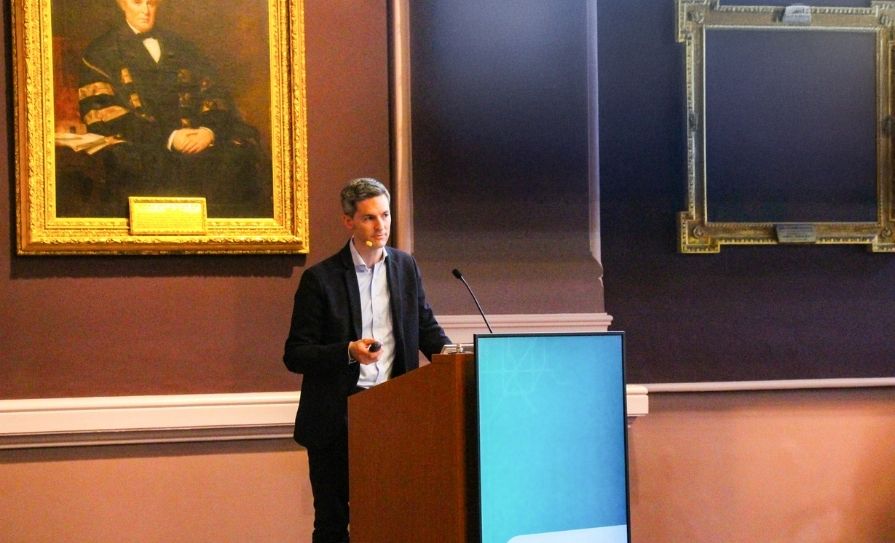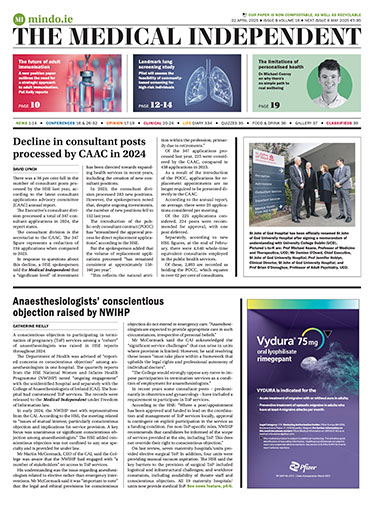In the coming days, hundreds of new interns will commence their careers as doctors, while trainees across the system change posts. Catherine Reilly reports on the demands of the July changeover
The upcoming NCHD changeover on 8 July will present difficulties for doctors, patients and the entire acute hospital system.
This mass upheaval of doctors has potential patient safety implications, as well as placing significant personal and professional pressures on NCHDs and extra demands on colleagues in acute hospitals.
Changeover in both January and July occurs on a Monday, when emergency departments (EDs) are at their busiest. According to the HSE, Monday is the preferred NCHD changeover day, as “this is a working day when the required clinical, managerial and supporting staff services are on-site to ensure the success of the process”. There are no plans to change this arrangement.
Dr Emily O’Conor, President of the Irish Association for Emergency Medicine, told the Medical Independent (MI) that patient handover is always a risky period. She said consultants, permanent registrars and advanced nurse practitioners in EDs are especially relied upon during the changeover.
Dr O’Conor believes the pressures placed on NCHDs and other staff during this time underlines the need to boost the consultant workforce.
“If you are working in a department that has very few consultants and lots of younger doctors changing over, then it is much more challenging. In the long-term in the Irish healthcare system, if we want to improve this, then we need to be investing in consultants who are trained, who don’t change over every six months or year; we need to be looking to have more of our care delivered by those types of doctors, rather than relying overly-heavily on doctors in training, or doctors who are not consultants.”

Most hospitals “still struggle with what we call the ‘induction piece’, because doctors coming into a new specialty or coming into a new hospital need some induction”, added Dr O’Conor.
“We
always struggle to deliver that piece, particularly in emergency medicine,
where there is no part of our service we can postpone or cancel [to better
accommodate this].”
‘Unacceptable risk’
Dr John Cannon, who is completing his
intern year, said there are “two distinct pieces” regarding changeover. “The
first and more significant piece is the issue regarding patient safety. This
cannot be
emphasised enough.”
The current system “whereby every single NCHD on a given medical team — with only a few exceptions — will leave the hospital on a Friday night and on Monday an entirely different team of doctors, who have never met the patient before and are not familiar with their personal medical scenario, will arrive to take over care, cannot be allowed to continue.
“To many doctors, this is an unacceptable risk to patient safety and significantly and meaningfully impacts on patients’ continuity of care, length of stay in hospital and ultimately, treatment outcomes. Any discussion regarding the personal impact of the changeover on clinicians must first be framed in the context of the more significant impact on patient safety.
“From this perspective, a nationally coordinated, staggered changeover, whereby a few doctors a week change roles, would significantly ameliorate the threat to patient safety and the continuity of care.”
As regards the “personal and professional stress” of changeover for NCHDs, some of these issues relate to long-standing problems in the HSE, such as lack of uniformity in IT systems and HR/medical manpower requirements, outlined Dr Cannon.
He says the implementation of a National Employment Record has helped, but not eradicated, such problems.
“Then you have Garda clearance and personal declarations that need to be signed by a commissioner for oaths/peace. Most public windows at Garda stations are closed every hour that NCHDs are off work. Having a gardaí clinic in a hospital for a day to get your forms stamped and Garda clearance submitted would make a big difference.”
The personal challenges associated with changeover are many and varied.
“The fact that the changeover rarely happens on the first of the month means that in some cases, doctors will have to double-rent for two months,” said Dr Cannon.
An initiative to help doctors find suitable accommodation and provide assistance with moving would be most welcome, he adds. “Even connecting doctors who are swapping jobs would be a big start.”
“We spend all our time and the best of our energy caring for our patients. We’d like to know that our employer has our best interests at heart and they are working hard to protect us from the stresses our jobs place on us,” according to Dr Cannon. “A national taskforce which could tackle the changeover would be a great start.”
Training bodies
The RCSI said it has initiatives to assist new trainees, including a specific annual induction day to meet fellow trainees, trainers and the College team, and an intensive ‘surgical boot camp’ for core trainees commencing their surgical training path.
However, a College spokesperson underlined there are “challenges for our trainees as they enter a health system which we know is suboptimally resourced with many vacancies across all specialties and disciplines, while at the same time the service demand is increasing.
To many doctors, this is an unacceptable risk to patient safety and significantly and meaningfully impacts on patients’ continuity of care, length of stay in hospital and ultimately, treatment outcomes
“A good hospital-based induction is essential but there are practical issues that should be addressed urgently by the hospitals and the HSE. These would include the ongoing problem trainees face in relation to being on emergency tax as they move from employer-to-employer. This is an unnecessary burden on trainees who have significant costs to cover as they move through the system.
“Around the country, there are rent ‘hot-spots’ and in other countries there are allowances towards rent and living costs to help support healthcare staff to serve their patients in these areas. Many of our international NCHDs have additional visa and work permit costs and processes which could be improved or better supported.”
The RCSI said it works closely with HSE National Doctors Training and Planning to highlight areas “where we can both support our trainees. We engage with our trainees on these issues and assist where we can.”
According to the HSE, it has undertaken “significant initiatives” to improve the transition process for NCHDs. This includes a recent project to streamline the payroll processes “to avoid the placing of the NCHD on emergency tax, where possible”.
“The HSE continues to make progress on the implementation of the recommendations from the MacCraith Report to improve the working and training experience of NCHDs,” added its spokesperson.
Additionally, the HSE considers that a staggered changeover “would not facilitate the seamless transfer of trainees from one clinical training placement to another”.
The Executive did not comment on whether it had any specific patient safety concerns in relation to changeover. Its spokesperson said that “arrangements in place are in line with other comparable clinical training justifications”.
‘Institutional memory’
Dr Fred English, an Irish doctor who is an advanced trainee in emergency medicine in Australia, described a smoother process. Australia doesn’t have a changeover. Instead, the intern and SHO grades are on different rotations to the registrar/senior registrar grades. “This means there is never more than one or two people on each team who are new to a team or hospital,” commented Dr English.
“There are consultants — there are lots of consultants,” he added. “This provides the institutional memory on the floor when new staff join. In EDs, there are rostered ‘non-clinical’ and ‘clinical support’ roles where staff familiar to the hospital can teach and support new staff members. Admin is well supported. The ‘on-boarding’ to a new hospital starts months in advance – up to a year in some cases — everything is planned to a tee. Induction is paid, structured and well designed — ID badges are ready at time-zero; log-ins, etc, are ready and IT are present at induction.”
Dr English said there is no emergency tax in Australia and all overtime — “if you even do any” — is paid.
Interns
In Ireland, incoming interns speak of uncertainty in mapping-out their lives for the year ahead. In the weeks approaching the start of her internship this July, Dr Róisín Connaughton told MI: “I don’t know what schedule we’ll follow. I don’t know how or who I need to ask for annual leave. I’m 29, so I have an Irish wedding and an international wedding in the next 12 months which I don’t know if I can go to, as I don’t know how hard it is to get leave approved.” She feels interns are tolerant of this uncertainty, as they are excited about beginning life as a doctor.
This year, however, there is some good news for incoming interns, who will be paid for their induction period following a deal between the IMO and healthcare management.
Induction for interns takes place the week before changeover “and that is where the big issue came about”, according to Mr Anthony Owens, IMO Director of Industrial Relations, Consultants and NCHDs.
“Had it been after the changeover, they would have been employees by right and would have had to be paid. But a little too clever by half, by bringing people in before they officially became employees, the excuse, I guess, was there was no means by which to pay them. This was something that absolutely and justifiably rankled and it just had to be fixed.”
Mr Owens said the costs arising for doctors who frequently have to move long distances is an issue the IMO will place greater focus on.
“We’ll certainly be making a push on that,” he said.
Under their contract, NCHDs on approved rotation schemes are entitled to claim vouched relocation expenses within the State once per annum, subject to a maximum payment of €500. These expenses principally relate to furniture removal; local short-term storage (up to three months) when required due to housing difficulties; the cost of one journey for the NCHD; and expenses incurred in lease of principal residence when the NCHD is the owner/occupier.
The HSE informed MI it did not have access to an aggregated record of relocation expenses, as these are held locally within medical manpower units.













Leave a Reply
You must be logged in to post a comment.